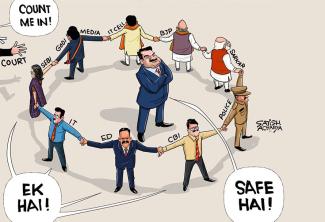The indictment of the Adani group in a multi-billion-dollar bribery scam and the arrest warrants issued consequently against Gautam Adani and his nephew Sagar Adani by the US Department of Justice mark the most serious blow to Adani's corrupt corporate empire to date. In January 2023, the Hindenburg disclosures had shocked the entire business world with details of the Adani group's monumental corporate fraud underpinning the phenomenal rise of the group in the Modi era. Subsequent Hindenburg reports and investigative revelations by the Organized Crime and Corruption Reporting Project unearthed the group's intricate network of offshore shell companies and the complicity of India's regulatory system. The Modi government dismissed the whole thing as an anti-India conspiracy and the Supreme Court relied on a non-performing SEBI whose chief is accused of being hand in glove with Adani's corrupt chain. As a result even though Adani's shares have taken a hit and globally Adani has been facing considerable outrage in the group's areas of operation, he has continued to enjoy absolute impunity in India.
This time round however the indictments have come from the US Department of Justice and are backed by solid investigation and evidence collected by the Federal Bureau of Investigation and the US Securities and Exchange Commission. The crime of bribery has been committed by the Adani group in India, but in the process the group has violated America's strict anti-bribery laws. The indictments include charges of multiple frauds perpetrated on the US investing public and global financial institutions, concealment of information and obstruction of justice. What the CBI, SEBI and the Indian judicial system should have done to probe and prosecute the Adani group for its shady dealings has been done by the American institutions comprising the FBI, SEC and the US Department of Justice.
While the future of the criminal case against the Adani group in the US is difficult to predict - Adani was quick to congratulate Trump on his comeback, promising $10 billion investment in US energy security and creation of 15,000 jobs - the whole world is bound to take it quite seriously. We can already see the impact in the Adani group having to cancel its $600 million bond offering, Adani shares taking a beating across the board and most crucially Kenya scrapping two long-term and widely protested Adani contracts of airport upgradation and construction of power lines. The thermal power agreement with Bangladesh and wind power project in Sri Lanka may well follow suit.
The phenomenal rise of the Adani group over the last decade or so has happened mostly in the infrastructure and energy sector by leveraging Gautam Adani's close relationship with Narendra Modi and India's strategic partnership with the US and Israel. From the controversial Carmichael coal mine in Australia to Haifa port in Israel and Colombo port in Sri Lanka to the power agreement with Bangladesh, almost every Adani contract in the world owes its existence to the Adani-Modi nexus. In fact, promoting the Adani empire has become a core objective of India's foreign policy in the Modi era. Even though Adani's heavy involvement in coal mining, thermal power and construction projects makes the group a major contributor to environmental pollution and destruction of forests, biodiversity and indigenous communities, not to speak of his complicity in the ongoing genocide of Palestinians, Adani has been desperately trying to project himself as a renewable energy champion, even sponsoring an Adani Green Energy Gallery in the London Science Museum. This is not simply to ‘greenwash’ the group’s image: Adani has been contemplating huge profits in the solar energy sector by bribing his way to secure overpriced power sale agreements with the Solar Energy Corporation of India and state distribution companies, as revealed pointedly in the indictment document.
Within India, the Modi government has been systematically handing over ports, airports, roads, power plants, forests, mines and real estate to the Adani group with non-BJP state governments also joining the competition to appease the Adani group with lucrative contracts. Indeed, the BJP is trying to distance itself from the Adani bribery scam in India by pointing to the fact that four of the five states named in the indictment document - Chhattisgarh, Tamil Nadu, Andhra Pradesh and Odisha - were then under non-BJP governments. But there can be no obfuscating the fact that the power sale agreements were routed through the SECI, a central PSU, and today states like Andhra Pradesh, Odisha and Chhattisgarh are all being ruled by the BJP and its allies. What stops the Modi government from announcing a credible and comprehensive probe into the Adani bribery scam, starting with the detailed bribe notes complete with per gigawatt bribe rate meticulously calculated by the uncle-nephew Adani duo?
The super profits of the Adani group, ensured through the bribing of the right officials, are extracted from the people by imposing hefty user fees and tariffs. Every time a Hindenburg report or a criminal case in any part of the world triggers a crash in Adani group shares, the loss also has to be borne primarily by India's retail investors. The indictment of the Adani group by the US Department of Justice may be only about the group's violation of American laws like the Foreign Corrupt Practices Act or the multiple frauds perpetrated by the group in the US and on US investors, but India's failure and refusal to probe the scam that happened in India will greatly erode India's credibility as a rule-based republic and economy. Of course given the Modi-Adani partnership and its pivotal role in India's current economic and political order, we can only expect statements of denial by the Adani group and the Modi government, eagerly amplified by the Godi media, and measures of suppression to stifle every demand for strong anti-corruption action. But for democracy to survive in India, the Modi-Adani coalescence will have to be overcome by all possible means.











